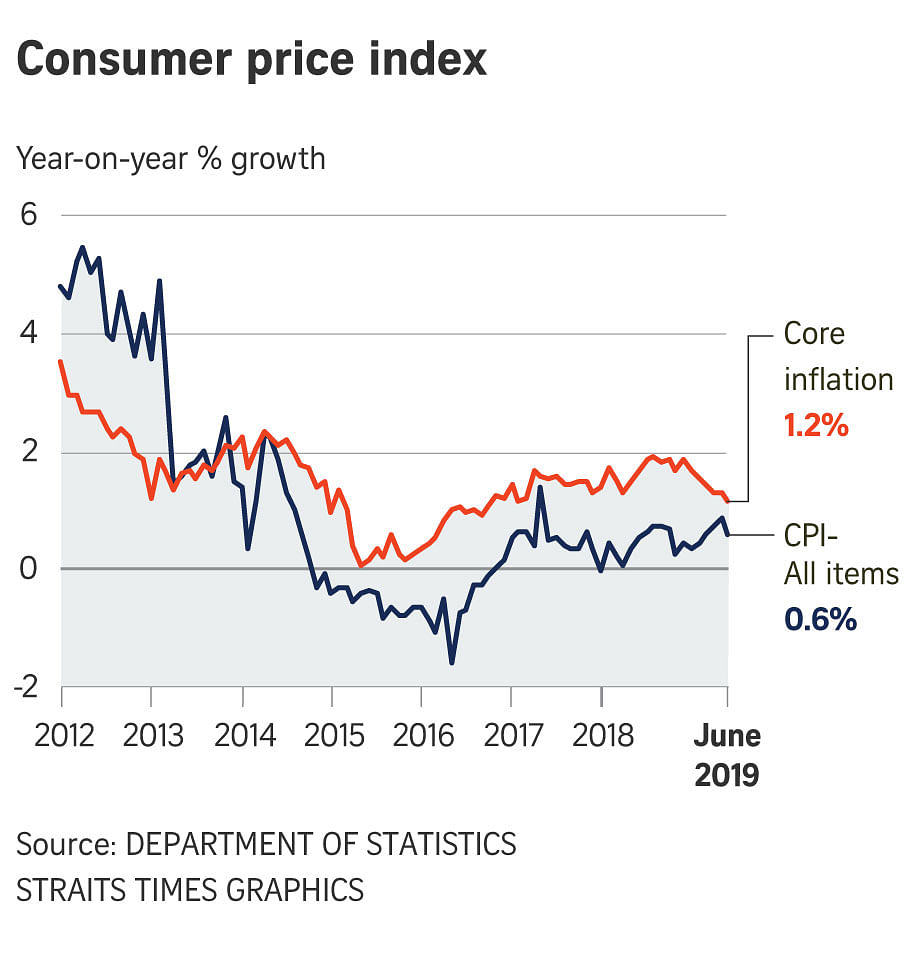SINGAPORE - Singapore's core inflation in June dropped to a more than two-year low while overall inflation declined for the first time in four months, according to data released on Tuesday (July 23).
Core inflation is the Singapore central bank's preferred price gauge in setting monetary policy as it excludes changes in the price of cars and accommodation, which are influenced more by government policies.
This measure came in at 1.2 per cent year on year in June, down from 1.3 per cent in May, due to lower services and retail inflation, as well as a steeper decline in the cost of electricity and gas. This was the lowest for core inflation since March 2017 when it was also 1.2 per cent.
Overall inflation eased, to 0.6 per cent in June, from 0.9 per cent in May. This was due to lower private road transport, services and retail inflation, as well as a larger decline in the costs of electricity and gas and accommodation, said the Ministry of Trade and Industry (MTI) and the Monetary Authority of Singapore (MAS) in a joint statement.
The core inflation figure came in just as analysts polled by Bloomberg had expected. However, overall inflation came in lower than the analysts' prediction of 0.8 per cent.
Economists polled by Reuters have raised their bets on a monetary policy easing by MAS in October amid sharp slowdown in growth and tame inflation.
MAS and MTI maintained their inflation outlook on Tuesday. They said that external sources of inflation are likely to be benign for the rest of the year, with global oil prices for the full year currently not being expected to exceed last year's average.

In Singapore, labour market conditions have largely held up and will support moderate wage increases but an acceleration in inflationary pressures is unlikely given slower economic growth, uncertainties in the global economy, as well as the continuing restraining effects of MAS' monetary policy tightening in 2018.
They reiterated that private road transport costs could pick up slightly this year while accommodation costs are likely to decline at a slower pace.
For the full year, core inflation is expected to come in near the midpoint of the forecast range of 1 to 2 per cent, while overall inflation is expected to average 0.5 to 1.5 per cent.
For June, the cost of private road transport rose slightly by 0.2 per cent year on year, moderating from the 1.5 per cent increase in May, mainly on account of a smaller rise in car prices and a decline in petrol prices.
Services inflation eased to 1.7 per cent, from 2 per cent the preceding month, largely reflecting smaller increases in holiday expenses and airfares, as well as a larger fall in telecommunication services fees, MAS and MTI noted.
The overall cost of retail items increased by 0.4 per cent. The slower rate of inflation was primarily due to a larger decline in the prices of telecommunications equipment, medical products and goods for recreation and entertainment, which more than offset a faster pace of increase in the prices of personal care products as well as a smaller decline in the prices of clothing and footwear.
The cost of electricity and gas declined by 4.8 per cent in June, steeper than the 4 per cent drop in May, due to the dampening effect of the nationwide launch of the Open Electricity Market on electricity prices.
Accommodation costs fell at a slightly faster pace of 1.1 per cent last month as compared with the 1 per cent decline in May, as a smaller increase in the cost of housing maintenance and repairs outweighed a more gradual decline in housing rentals.
Food inflation was 1.4 per cent in June, unchanged from May, as an uptick in food services inflation broadly offset a smaller increase in the prices of non-cooked food items.


